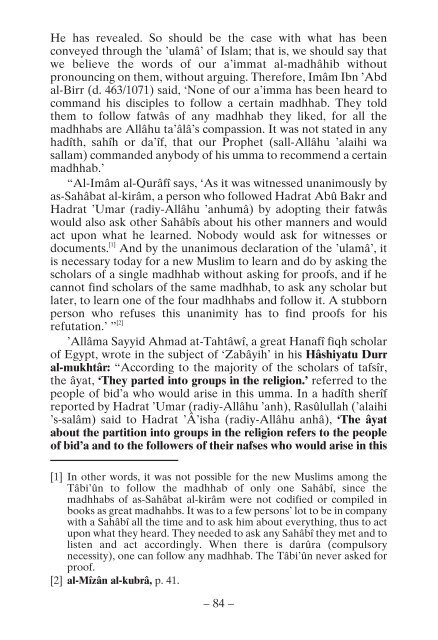Answer to an Enemy of Islam
Answer to an Enemy of Islam This is a refutation of the lies and slanders which the lâ-madhhabî Rashîd Rıdâ of Egypt, who appeared in the disguise of a religious man and wrote against the scholars of Islam in his book Muhâwarât.
Answer to an Enemy of Islam
This is a refutation of the lies and slanders which the lâ-madhhabî Rashîd Rıdâ of Egypt, who appeared in the disguise of a religious man and wrote against the scholars of Islam in his book Muhâwarât.
You also want an ePaper? Increase the reach of your titles
YUMPU automatically turns print PDFs into web optimized ePapers that Google loves.
He has revealed. So should be the case with what has been<br />
conveyed through the ’ulamâ’ <strong>of</strong> <strong>Islam</strong>; that is, we should say that<br />
we believe the words <strong>of</strong> our a’immat al-madhâhib without<br />
pronouncing on them, without arguing. Therefore, Imâm Ibn ’Abd<br />
al-Birr (d. 463/1071) said, ‘None <strong>of</strong> our a’imma has been heard <strong>to</strong><br />
comm<strong>an</strong>d his disciples <strong>to</strong> follow a certain madhhab. They <strong>to</strong>ld<br />
them <strong>to</strong> follow fatwâs <strong>of</strong> <strong>an</strong>y madhhab they liked, for all the<br />
madhhabs are Allâhu ta’âlâ’s compassion. It was not stated in <strong>an</strong>y<br />
hadîth, sahîh or da’îf, that our Prophet (sall-Allâhu ’alaihi wa<br />
sallam) comm<strong>an</strong>ded <strong>an</strong>ybody <strong>of</strong> his umma <strong>to</strong> recommend a certain<br />
madhhab.’<br />
“Al-Imâm al-Qurâfî says, ‘As it was witnessed un<strong>an</strong>imously by<br />
as-Sahâbat al-kirâm, a person who followed Hadrat Abû Bakr <strong>an</strong>d<br />
Hadrat ’Umar (radiy-Allâhu ’<strong>an</strong>humâ) by adopting their fatwâs<br />
would also ask other Sahâbîs about his other m<strong>an</strong>ners <strong>an</strong>d would<br />
act upon what he learned. Nobody would ask for witnesses or<br />
documents. [1] And by the un<strong>an</strong>imous declaration <strong>of</strong> the ’ulamâ’, it<br />
is necessary <strong>to</strong>day for a new Muslim <strong>to</strong> learn <strong>an</strong>d do by asking the<br />
scholars <strong>of</strong> a single madhhab without asking for pro<strong>of</strong>s, <strong>an</strong>d if he<br />
c<strong>an</strong>not find scholars <strong>of</strong> the same madhhab, <strong>to</strong> ask <strong>an</strong>y scholar but<br />
later, <strong>to</strong> learn one <strong>of</strong> the four madhhabs <strong>an</strong>d follow it. A stubborn<br />
person who refuses this un<strong>an</strong>imity has <strong>to</strong> find pro<strong>of</strong>s for his<br />
refutation.’ ” [2]<br />
’Allâma Sayyid Ahmad at-Tahtâwî, a great H<strong>an</strong>afî fiqh scholar<br />
<strong>of</strong> Egypt, wrote in the subject <strong>of</strong> ‘Zabâyih’ in his Hâshiyatu Durr<br />
al-mukhtâr: “According <strong>to</strong> the majority <strong>of</strong> the scholars <strong>of</strong> tafsîr,<br />
the âyat, ‘They parted in<strong>to</strong> groups in the religion.’ referred <strong>to</strong> the<br />
people <strong>of</strong> bid’a who would arise in this umma. In a hadîth sherîf<br />
reported by Hadrat ’Umar (radiy-Allâhu ’<strong>an</strong>h), Rasûlullah (’alaihi<br />
’s-salâm) said <strong>to</strong> Hadrat ’Â’isha (radiy-Allâhu <strong>an</strong>hâ), ‘The âyat<br />
about the partition in<strong>to</strong> groups in the religion refers <strong>to</strong> the people<br />
<strong>of</strong> bid’a <strong>an</strong>d <strong>to</strong> the followers <strong>of</strong> their nafses who would arise in this<br />
[1] In other words, it was not possible for the new Muslims among the<br />
Tâbi’ûn <strong>to</strong> follow the madhhab <strong>of</strong> only one Sahâbî, since the<br />
madhhabs <strong>of</strong> as-Sahâbat al-kirâm were not codified or compiled in<br />
books as great madhahbs. It was <strong>to</strong> a few persons’ lot <strong>to</strong> be in comp<strong>an</strong>y<br />
with a Sahâbî all the time <strong>an</strong>d <strong>to</strong> ask him about everything, thus <strong>to</strong> act<br />
upon what they heard. They needed <strong>to</strong> ask <strong>an</strong>y Sahâbî they met <strong>an</strong>d <strong>to</strong><br />
listen <strong>an</strong>d act accordingly. When there is darûra (compulsory<br />
necessity), one c<strong>an</strong> follow <strong>an</strong>y madhhab. The Tâbi’ûn never asked for<br />
pro<strong>of</strong>.<br />
[2] al-Mîzân al-kubrâ, p. 41.<br />
– 84 –

















